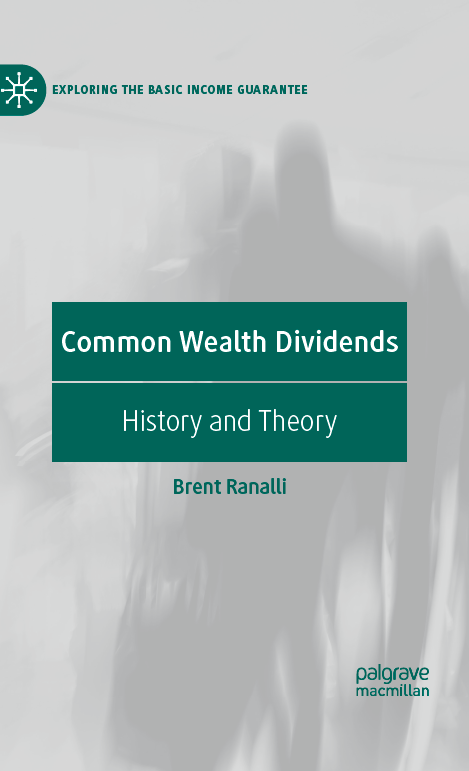By Ronin Institute Research Scholar Brent Ranalli
“How will we pay for it?” is one of the questions most commonly asked about basic income. My new book, Common Wealth Dividends: History and Theory (Palgrave Macmillan), examines a type or variant of basic income that has a source of funding built right in. Common wealth dividends, if widely implemented, would not only immediately enhance economic security, they might also pave the way for wider acceptance of a “full” basic income.
The idea behind common wealth dividends is that there are some things in this world, like land and natural resources, that ought to be considered our common heritage, and that those who own or control these common-heritage resources owe some compensation to the rest of us…
The idea behind common wealth dividends is that there are some things in this world, like land and natural resources, that ought to be considered our common heritage, and that those who own or control these common-heritage resources owe some compensation to the rest of us who are excluded from their use. This insight has struck many individuals separately over the years. In at least three significant cases, it was discovered and fleshed out independently in different domains: Thomas Paine, hero of the American and French revolutions, applied the principle to the distribution of land in a 1797 pamphlet. Alaska Governor Jay Hammond applied it to oil in the 1970s, leading to the creation of the Alaska Permanent Fund, which distributes a share of the state’s invested oil wealth annually to every Alaskan. And entrepreneur Peter Barnes applied it to the atmosphere as a sink for greenhouse gases at the turn of the twenty-first century, inventing the concept of the carbon dividend.
As a work of history, the book tells the story of the discovery and rediscovery of this moral insight: how it has been put into action in some cases (like Alaska’s Permanent Fund Dividend), and how there have been near-misses in others (like a similar proposal to ensure that all residents of Maine benefit from big bottlers’ exploitation of Maine groundwater), and how at times the idea was buried (like the astonishingly long neglect of Paine’s original proposal), and how we may be on the cusp of implementing it on a wide scale (in the case of carbon dividends).
As a work of theory, the book seeks to generalize from particular cases and explore the possibility of articulating a general theory of common wealth dividends. We want to know: How far beyond land and natural resources can the principle be generalized? Does it apply, for example, to man-made commons? The book looks at Internet domain names, the broadcast spectrum, and our monetary system as examples of man-made resources that arguably could and should be tapped as sources of common wealth dividends.
… the book tells the story of the discovery and rediscovery of this moral insight: how it has been put into action in some cases… and how there have been near-misses in others… and how at times the idea was buried…and how we may be on the cusp of implementing it on a wide scale

I first became interested in the topic as a student, and I started actively working on it about ten years ago, giving talks at basic income and environmental studies conferences and writing research papers. The Ronin Institute helped me participate in one of these conferences—in fact, the one where I made the contacts that led to the book contract. And conversations with colleagues, including The Ronin Institute’s Emily Monosson, helped me hone the book proposal.
I have a full-time job in environmental policy, so my personal scholarship is done in spare time, mostly in the evenings. I have found that having just a few hours a day to devote to research and writing leads to very efficient use of that time. That was the case with this project. Two of the five chapters were written before getting the contract with the publisher. The remaining three chapters were written in about half a year of intensive effort, broken up by smaller projects, including editing issues of the Thoreau Society’s quarterly Thoreau Society Bulletin. One related recent publication that fellow Ronin Scholars might enjoy is an essay on what Henry David Thoreau would think of proposals for basic income.
The Common Wealth Dividends book is published in hardcover and electronic formats. It is priced for libraries, so individual readers might get sticker shock. Those who are affiliated with research institutions should have ready access to it. There is also a sample chapter posted on my personal website. Those who read that chapter and are interested in more should feel free to get in direct contact with me. (And of course, please feel free to encourage your local library to purchase it!)
Now that Common Wealth Dividends is published, I am looking for opportunities to speak about the book and raise awareness about the topic. Any suggestions and ideas about speaking opportunities are most welcome. Another thing I am planning to do is to help educate around and lobby for carbon dividends specifically. This might be the session of the U.S. Congress that takes some meaningful action on carbon pricing, and with a nudge in the right direction it could be the session of Congress that establishes the first nationwide common wealth dividend program in the U.S. I am working on this project with colleagues at Feasta, a sustainability think tank. On Feasta’s blog I have published a primer for carbon pricing in the U.S. and a discussion of how to design a carbon permit auction system.
Brent Ranalli is a policy practitioner who consults for public-sector clients at The Cadmus Group, LLC. His writings on common wealth dividends, Basic Income, and other policy topics have been published in Basic Income Studies and Basic Income News and in the USBIG discussion paper series, as well as in the Journal for Refugee Studies, the Journal for Sustainability Education, Foreign Affairs, and Controversies in Globalization, 2nd edition. Brent co-edits Environment: An Interdisciplinary Anthology for Yale University Press and serves as editor of the Thoreau Society Bulletin.
This post is a perspective of the author, and does not necessarily reflect the views of the Ronin Institute.


Hi Brent, I am happy to report that I was able to get our local library to obtain a copy (available to anyone in the MLN in the Greater Boston area or via Interlibrary Loan): https://find.minlib.net/iii/encore/record/C__Rb4022788?lang=eng
Excellent!